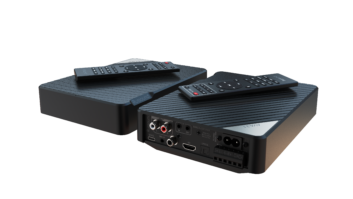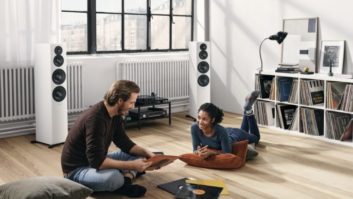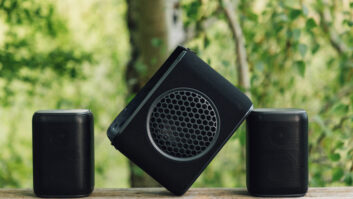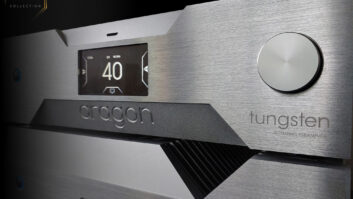Russound is hosting a technology preview of its latest powerline-network multiroom-audio system for the retrofit market during CEDIA Expo.
Russound is replacing three speaker series with one, and launching its lowest-priced controller-based multiroom-audio system.
The retrofit system, dubbed the Collage, will reduce the equipment costs of a typical multiroom audio system with intercom functionality in a retrofit install by substantially more than half while also reducing retrofit labor costs by more than half, said product management director Andy Lewis without divulging prices.
“We are confident,” he added, “that the system cost will also be substantially less than half that” of the company’s first powerline-based retrofit system, the Avenue, which ships in November, he added.
Also unlike Avenue, the new system scales to as many as 10 zones, connects to 40 or more sources, and connects to such new music sources as networked PCs, network attached-storage (NAS) devices and Internet radio, Lewis said. It also serves as an in-home intercom systems and baby monitor.
“For installers facing a flat economy and housing market, this is just what they’re looking for,” Lewis claimed.
Collage is on display at the Hyatt and will ship in the second quarter at the latest, said Lewis.
Collage’s main components include an in-wall amplified keypad, which incorporates RDS-equipped FM tuner, and a Media Manager device, which connects to a home’s Ethernet network and acts as a bridge between the Ethernet network and the powerline network. The universal plug-and-play-equipped, DLNA-certified device also connects to ShoutCast’s subscription-free Internet radio aggregation site to stream Internet radio to the keypads. The subscription-based Rhapsody music service can also be streamed to the keypads, as can music on Ethernet-connected PCs and NAS devices and a powerline-network iPod dock. The keypads will display cover art from networked sources.
To install the keypads, integrators cut a hole in the wall above an electrical outlet or near a light switch, then run Romex from the outlet or switch to the keypad to deliver power and connect it to the powerline network.
The system also connects to legacy sources via an IR source bridge, which features analog-stereo and digital audio inputs, composite-video input for use with a security camera, and IR outputs to control IR sources.
The double-gang keypads, about a third taller than traditional keypads, feature a click wheeel to navigate menus and double as an intercom for room-to-room communications and baby monitoring. The keypad’s amp is rated at 2×15 watts into 8 ohms and are 4-ohm stable. It also features built-in FM antenna and external-antenna jack.
Unlike other retrofit systems, including the powerline-based Avenue, Collage is scalable “because we don’t have a big black box with a fixed number of zones,” Lewis said. Installers can put in one or two zones and later add more.
The Avenue system consists of a $2,100 powerline-network hub that plugs into a $3,999-MAP CAV6.6 six-zone, six-source controller, which in turn connects to the six in-wall unamplified keypads bundled with the controller. The CAV6.6 connects to source components, and the connected hub encodes and transmits the sources’ audio over powerlines to the $950 Point amplifier/decoders installed in up to six rooms. From there, audio is sent to in-room or custom-installed speakers.
Another new powerline product, the iBridge iPod dock, which uses powerlines instead of home-runned Cat-5 cable to connect to a traditional Russound R-NET multiroom-audio controller in another room. The company already offers a dock that connects via a home run of Cat-5.













